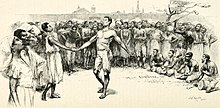

| Percussion instrument | |
|---|---|
| Classification | Membranophone |
| Hornbostel–Sachs classification | 211.212.1 (Cylindrical drums) |

Abamboula is a type of drum made from a rum barrel with skin stretched over one end.[1] It is also a dance accompanied by music from these drums.


Originating in Africa, the bamboula form appears in a Haitian song in 1757 and bamboula became a dance syncopation performed to the rhythm of the drum during festivals and ceremonies in Haiti (then Saint-Domingue). It was then exported to the United States (notably Mobile, Alabama, and the Virgin Islands) through Louisiana, by the slaves who were deported to New Orleans[2][3][4] during the 18th century with the arrival of the displaced French settlers of the island of San Domingo especially after the Haitian Revolution. The slaves congregated on the Congo Square to the edge of the area of the French Quarter of New Orleans to dance the bamboula.
In 1848, the American composer Louis Moreau Gottschalk, born in New Orleans, Louisiana, and whose maternal grandmother was a native of Saint-Domingue, composed a piece entitled Bamboula, the first of four Creole inspired piano works known as his Louisiana Quartet.
In the present-day French language, the word bamboula has become an ethnic slur, directed at black people.[5][6][7]
|
| |||||
|---|---|---|---|---|---|
List of percussion instruments | |||||
| Pitched percussion |
| ||||
| Unpitched percussion |
| ||||
| Electronic percussion |
| ||||
| Percussion groupings |
| ||||
| Other |
| ||||
This Haiti-related article is a stub. You can help Wikipedia by expanding it. |
This Louisiana-related article is a stub. You can help Wikipedia by expanding it. |
This article relating to membranophones is a stub. You can help Wikipedia by expanding it. |